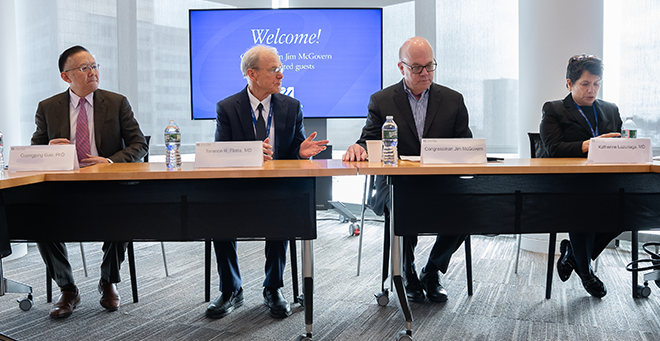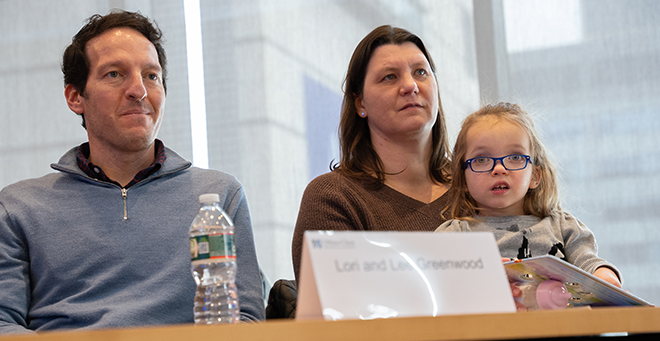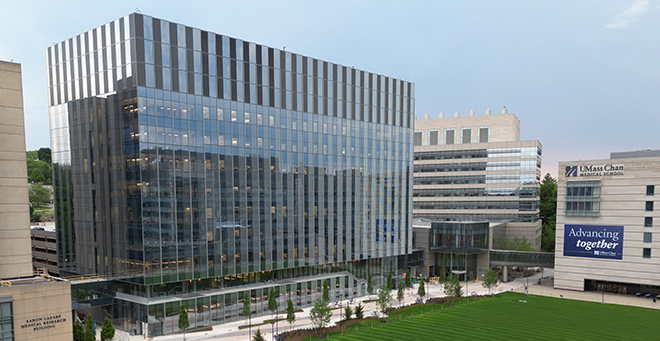
From left, Guangping Gao, Terence Flotte, James McGovern, and Katherine Luzuriaga at the start of the roundtable discussion
Photo: Bryan Goodchild
The local impact of proposed funding cuts to the National Institutes of Health and Medicaid was at the center of a roundtable discussion at UMass Chan Medical School on Thursday, Feb. 20.
Led by U.S. Rep. James P. McGovern and Terence R. Flotte, MD, the Celia and Isaac Haidak Professor, executive deputy chancellor, provost and dean of the T.H. Chan School of Medicine, the discussion centered around President Donald Trump’s attempt to cap the NIH indirect cost rate reimbursement to 15 percent on all existing and new research grants. Panelists also described the ramifications that deep cuts to Medicaid, proposed by congressional Republicans, would bring. The roundtable included participants who are directly impacted by the potential cuts, including more than a dozen researchers, patients, biotech industry leaders and community organizers.
“The research that goes on here at UMass Chan and so many other institutions across the Commonwealth of Massachusetts and in the country saves lives and improves the quality of people’s lives. I want to show my colleagues in Washington that everyday people cannot afford the cuts to Medicaid being proposed, and the world can’t afford to lose any progress on cutting-edge research that is going on right now to combat so many diseases and so many challenges that people face,” McGovern said.
Dean Flotte said, “Most patients that we all serve are from families of working poor. We’re focused on rare diseases, patients who would otherwise not have hope. They’re among the most vulnerable. Similarly, in the broader population, people who use Medicaid are most vulnerable. The people on this panel are here because they believe in what they do, not because they think it’s easier if their work is paid for by federal money. They’re here because this is really working for the betterment of our most vulnerable patients.”
Related media coverage:
‘So inhumane’: at UMass, patients’ families decry Trump administration’s move to slash NIH funding
Spectrum News 1
UMass Chan Medical School leaders discusses proposed NIH cuts
"Without funding, we lose hope": Worcester laments possible NIH & Medicaid cuts
WCVB-TV
Massachusetts families, lawmakers fighting to keep NIH funding for life-saving medical research
UMass Chan roundtable: Trump's NIH and Medicaid cuts will lead to company closures, job losses, and a reduction in quality of health care
On Feb. 10, the attorneys general in 22 states, co-led by Massachusetts Attorney General Andrea Campbell, filed a federal lawsuit in the U.S. District Court in Boston claiming that the directive issued on Feb. 7 by the NIH to cap the indirect cost rates at 15 percent is unlawful. A hearing with all parties to the lawsuit has been scheduled for Friday, Feb. 21, and a decision will later be issued, which will be subject to potential appeals.
Erik Sontheimer, PhD, the Pillar Chair in Biomedical Research and professor of RNA therapeutics, spoke to the immediate and long-term implications of the indirect cost rate cuts.
“There are multiple levels at which these cuts would make themselves felt. Some of them would be immediate in terms of the effects on employment. Some of them would be scientific in terms of the opportunities lost for the gain of new knowledge. Perhaps most costly of all would be the effect it would have on the future pipeline of those in academic medicine, and the effect on our knowledge economy and on the future workforce for the fabulously successful and ever-growing biotech industry,” Dr. Sontheimer said.
UMass Chan faculty members participating in the roundtable included Sontheimer; Katherine Luzuriaga, MD, the UMass Memorial Health Care Chair in Biomedical Research, vice provost for clinical and translational research and professor of molecular medicine, pediatrics and medicine; Stephanie Carreiro, MD, associate professor of emergency medicine; Joel Richter, PhD, the Arthur F. Koskinas Chair in Neuroscience and professor of molecular medicine; and Guangping Gao, PhD, the Penelope Booth Rockwell Professor in Biomedical Research, director of the Horae Gene Therapy Center, director of the Li Weibo Institute for Rare Diseases Research and chair and professor of genetic & cellular medicine.

Four-year-old Noa Greenwood and her parents, Lee and Lori Greenwood, listen in on the roundtable discussion
Photo: Bryan Goodchild
Dr. Gao sat beside 4-year-old Noa Greenwood and her parents, Lee and Lori Greenwood. In June 2022, Noa became the third child to receive promising gene therapy for Canavan disease, a progressive and rare genetic disorder affecting the central nervous system, muscles and eyes. The gene therapy was developed by researchers at UMass Chan.
Lee Greenwood shared his daughter’s story, underscoring the life-saving impact of NIH-funded research.
“These funding cuts that are proposed, it’s very personal for our family. Noa was able to get the gene therapy, but there are so many Noas. There are countless rare diseases, and all those diseases have human beings that need help from all of you, and for Washington to disregard that is just not acceptable,” Lee Greenwood said.
The roundtable panel also included Brian Brown, a patient receiving care through the Duchenne Muscular Dystrophy program, and his mother, Amy Brown; Lorelei Stoica, PhD’15, executive director at Ultragenyx; Geoffrey McDonough, president and CEO of Generation Bio; Shane Byrne, co-founder and chief scientific officer at Codomax; Jon Weaver, president and CEO of Massachusetts Biomedical Initiatives; Bill Stock, vice president for government and community relations at Seven Hills Foundation; Stephen Kerrigan, president and CEO at Kennedy Community Health; and Lovo Koliego, MSN, RN, founder of Community Health Awareness Network Grows Equity.

